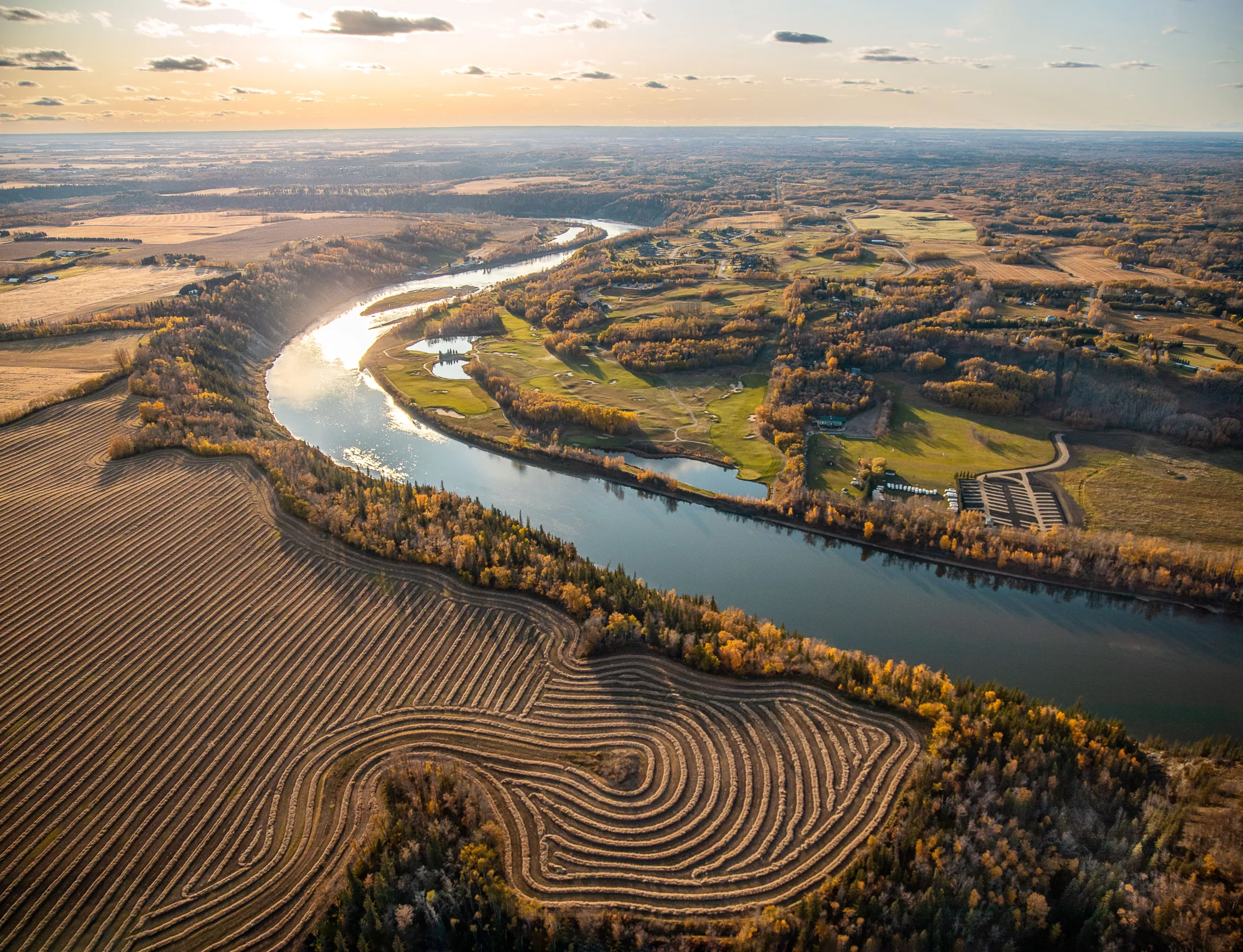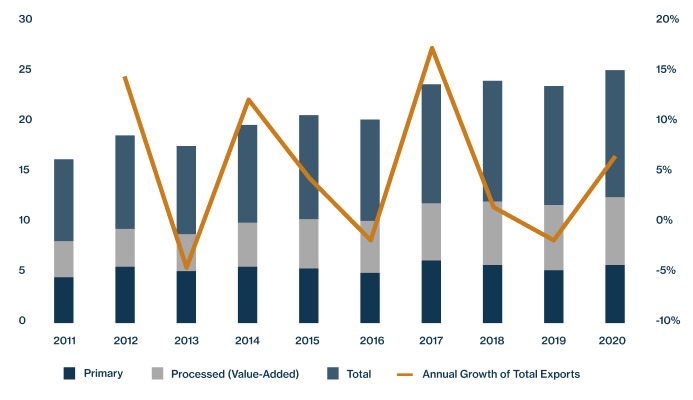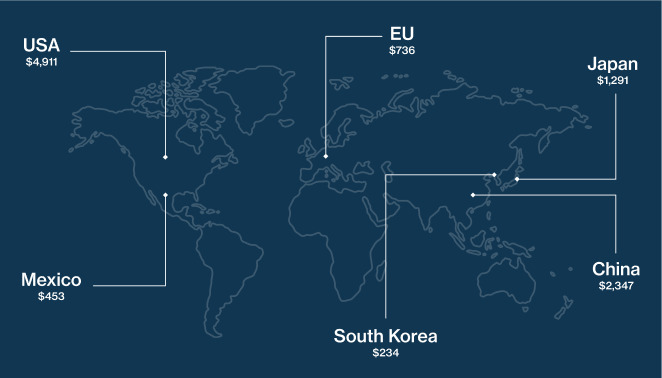
Agribusiness & Farming Opportunities in Alberta, Canada
Alberta provides the global food supply chain with sustainable farming and Agritech.
Alberta is a leading center for sustainable farmland practices and food production, catering to the global demand for food manufacturing exports. Its agricultural sector thrives on traditional farming methods and innovations such as biomass utilization, vertical farming, and alternative protein operations. Alberta offers unmatched access to North American and international markets, through being strategically located on the CANAMEX Corridor and accessible via Canadian Pacific Railways and three international airports. Its expansive agricultural land supports farming and industrial development, with companies like NOVA Chemicals developing one the largest ethylene and polyethylene production plants in the world, and GoodLeaf Farms innovating in vertical farming in Calgary.
The Alberta Agri-Processing Investment Tax Credit provides a 12% tax credit for companies investing in agri-processing facilities. Alberta with its extensive land and innovative farming practices, opens doors to the international agricultural market, making it an attractive location for foreign direct investment and business development in the agriculture industry.
Photo Credit: © Travel Alberta by Dan Schyk
Alberta Stories
S3 Group
A TOP BEEF & WHEAT EXPORTER IN THE WORLD
As one of the world’s top beef exporters, Alberta’s cattle ranching industry is a major part of the global beef market, with $3.6B in beef exported internationally. In 2022, Alberta’s agricultural exports were valued at over $16.1 billion, showcasing the sector’s substantial contribution to the economy. This total included $7.3 billion in primary agricultural products and $8.8 billion in value-added products, highlighting the importance of both raw and processed goods in the agricultural industry.
Alberta is also a leading exporter in the global wheat market, with an average of 7 million tonnes of wheat exported to 70 countries worldwide annually. The province boasts a highly diversified sector of crop production, including oats, barley, canola, and pulses. The province is the third largest exporter of agri-food products in Canada. Major export partners include: USA, China, Japan, Mexico, and South Korea.
Alberta’s agricultural sector is foundational to the province’s economy — contributing $10.2 billion in GDP in 2022 and employing 69,000 Albertans. The province offers high-quality primary products and is the third largest exporter of agri-food products in Canada.
ALBERTA’S SHARE OF PRODUCTION FOR SELECTED CROPS
Firms operating in Alberta have preferred market access to 51 international countries representing approximately 1.5 billion consumers with a combined GDP of $49.3 trillion USD. The province also boasts a globally trade-efficient transportation system located in North America’s Foreign Trade Zones.
| Canada is the World’s | Alberta Produces (2022) | Alberta Exports (2022) |
|---|---|---|
| #1 exporter of canola seed | 29.9% of Canada’s canola (5.6 million tonnes) | $1.94 billion |
| #3 exporter of wheat after Russia and the United States | 33.0% of Canada’s wheat (11.3 million tonnes) | $3.12 billion |
| #1 exporter of dry peas | 32.1% of Canada’s pulses (peas, beans, faba beans, chick peas and lentils at 2.0 million tonnes) | $386.29 million |
| #5 exporter of barley | 53.9% of Canada’s barley (5.4 million Tonnes) | $407.34 million |
A GROWING FOOD PROCESSING INDUSTRY
The sub-sector increased by 6.71% CAGR from 2011 to 2020 and was Alberta’s largest manufacturing sector with $15.5 billion in sales in 2020.
Alberta Primary & Value-Added Agriculture Exports
(Billion CAD)

Alberta’s Top Agri-Food Markets
(Million CAD)

ALBERTA FOOD MANUFACTURING AND PROCESSING
Alberta’s availability of raw ingredients, like wheat and canola, coupled with advanced food processing technologies, allows for the production of a wide variety of food manufacturing and processing products. Including meat products, grain and oilseed milling, and the production of snack foods, functional foods, natural health products, and beverages.
Alberta also boasts world-class research and development facilities such as the Food Processing Development Centre (FPDC) and the Agrivalue Processing Business Incubator, which supports companies bringing new products to national and international markets. With numerous food processing plants and facilities, Alberta meets consumer demands by contributing to a substantial portion of the global food supply chain.
GREENHOUSE FARMING BUSINESS
Alberta’s climate, characterized by relatively warm conditions, consistent sunlight, and the availability of natural resources like low-cost natural gas and water, makes it a strategic location for greenhouse farming businesses. These environmental conditions, along with the utilization of solar energy, vertical and hydroponic farming techniques, facilitate the development of greenhouse structures that support the production of high-quality crops including tomatoes, cucumbers, eggplant, and peppers.
As of 2019, there were about 195 commercial greenhouses in Alberta, demonstrating an established greenhouse business sector. These greenhouses are primarily concentrated in Red Deer (22%), Edmonton (20%), and Medicine Hat (18%). Collectively, these facilities occupy an area of approximately 404 acres (164 hectares), translating to around 17.62 million square feet or 1.64 million square metres of greenhouse space.
NATURAL GAS RATES FOR ALBERTA FARMS
In September 2021, the rate for natural gas was $3.87/GJ
NETWORK OF AGRICULTURAL INNOVATORS AND AGRONOMISTS
Alberta has over 22 research and innovation facilities specializing in crops and cereals, poultry and swine research, agronomy, biomaterials, and food safety. The federal and provincial governments both offer tax incentives to conduct research and development.
The Food Processing Development Centre (FPDC) in Leduc features the Agrivalue Processing Business Incubator.
The sector is also supported by academic institutions that conduct research and offer programs in agriculture and agribusiness.
SUPPORTED BY THE LATEST AGRICULTURAL TECHNOLOGY
Alberta’s agricultural sector is enhanced by its integration with a developing farming technology ecosystem. Olds College is known for its agricultural technology programs designed to equip Albertans with the necessary skills to be at the forefront of this technological movement in agriculture.
It is estimated that by 2024, agribusinesses will invest approximately $684 million in digital transformation within Alberta’s agricultural industry. The integration of innovative advance technology in agricultural practices, is expected to positively influence crop production, soil conditions, and the future of agriculture in the region.
BIOFUEL AND GREEN ECONOMY LEADERSHIP
Alberta’s bio-industrial sector is moving the province forward in the green economy with advancements in bio-based fuels, energy, materials and natural health products. Alberta’s initiatives in bio-based energy and materials contribute significantly to renewable energies and sustainable development.
The emphasis on renewable fuels, such as sustainable aviation fuel and transportation fuels, aligns with global environmental policies and efforts to reduce GHG emissions. Alberta’s approach includes exploring non-toxic alternative fuels while improving renewable energy gain from natural resources, thereby promoting a circular economy.
Areas of Focus
Primary Production
-
Canola seed
-
Pulses (peas, beans, faba beans, chickpeas and lentils)
-
Barley
-
Live cattle
The province’s arable lands, abundance of sunshine and extensive irrigation network makes it an ideal place to produce primary agricultural products.
Agri-Food Processing
-
Canola and oilseed milling
-
Vegetable processing
-
Meat and specialty meat manufacturing
-
Snack foods and functional foods
-
Natural health products and beverages
-
Pulse processing
-
Prepared animal feeds
-
Malt
Alberta’s food processing sector has seen rapid growth. In 2020, it was the province’s largest manufacturing sector with $15.5 billion in food manufacturing sales.
Bio-Industrial Products
-
Bio-fuels and energy
-
Bio-materials
-
Natural health products
-
Bio-based chemicals
Alberta is home to several innovation centres that supports the development of new bio-based products.
Agri-Tech
-
Advanced monitoring
-
Big data
-
IoT-based sensor networks
-
Satellite photography and sensors
-
Computer vision and spectral analytics
-
Hydroponics
Alberta’s innovators collaborate with farmers to increase yields, find efficiencies and promote sustainability through increased connectivity and data.
ENVIRONMENTAL, SOCIAL AND GOVERNANCE
Alberta is investing millions into growing sustainable food while offsetting 2.5 million tonnes of emissions from the agriculture and agri-food sectors.
Emissions Reduction Alberta
Investing $33 million in tech innovations which will lead to a cumulative GHG reduction of up to 2.7 million tonnes of CO2e by 2030.
Sustainable Beef
Canadian beef has one of the lowest GHG footprints, nearly 50% lower than the global average.
Decreased Water Usage
Canadian beef producers reduced their water usage by 17% from the 1980s to the 2010s.
Project Clean Cow
Sustainable approach to cutting agricultural methane emissions by at least 30%.
TALENT
Alberta is home to a highly educated workforce and several post-secondary institutions that specialize in agriculture, science and engineering.
Highly Educated Workforce
Alberta has one of the most educated workforces with 55% of Albertans aged 25 to 64 having completed a post-secondary program.
STEM Talent
Alberta’s post-secondary institutions had 3,525 science and technology; 4,225 engineering and engineering tech; and 1,525 math and computer science graduates in 2020.
Robust Workforce
The agricultural and agri-food sector employs over 69,800 Albertans.
Educational Programs
Post-secondary institutions across the province offer innovative agriculture and agribusiness-related programs.
INFRASTRUCTURE
Alberta boasts a well-connected transportation system and approximately 67.9% of the irrigated farmland in Canada.
Well Irrigated
Alberta has the largest irrigated area in Canada with nearly 680,000 hectares of irrigated land.
Investing In Irrigation
An $815-million investment will modernize irrigation infrastructure and increase water storage capacity, creating up to 6,800 direct and indirect permanent jobs and up to 1,280 construction jobs.
Affordable Natural Gas
Alberta’s natural gas infrastructure provides affordable heat and power to rural farms and greenhouses.
Well Connected
Edmonton and Calgary are ranked among the top mid-size cities globally for transportation costs.